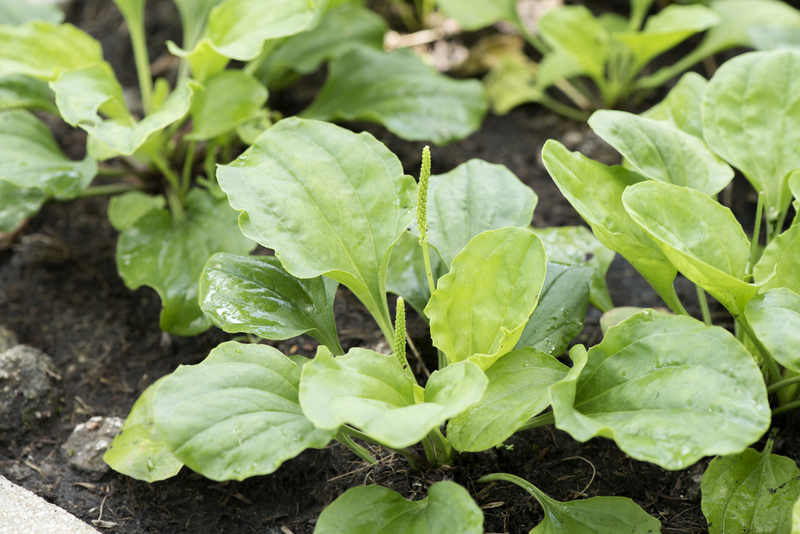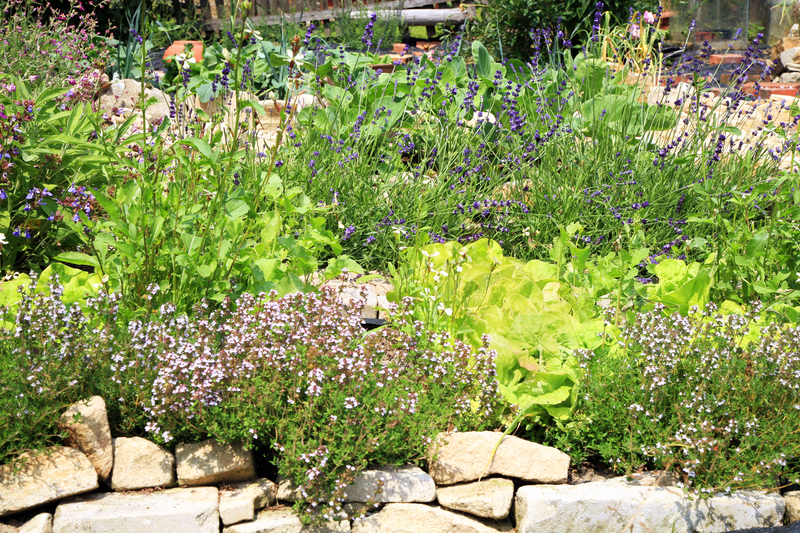Harnessing Organic Waste for Soil Enrichment
Posted on 18/09/2025
Harnessing Organic Waste for Soil Enrichment: A Sustainable Approach
In the age of environmental consciousness, harnessing organic waste for soil enrichment stands out as a practical, eco-friendly, and highly effective way to improve soil fertility. As organic matter is a cornerstone of healthy soils, utilizing what is often seen as waste presents a win-win for gardeners, farmers, and the planet alike. This comprehensive article explores diverse methods, benefits, and best practices in transforming organic waste into precious nutrients for the soil, along with the broader impacts on agriculture, waste management, and climate resilience.
Understanding Organic Waste and Its Role in Soil Fertility
Organic waste encompasses biodegradable materials originating from plants or animals - think kitchen scraps, yard clippings, manure, straw, and agricultural residues. These materials, when properly recycled or decomposed, morph into valuable amendments that feed the earth's surface and underpin healthy plant growth.
The Science Behind Soil Enrichment with Organic Waste
The enrichment of soil with organic matter boosts soil structure, enhances its nutrient content, improves water retention, and stimulates a thriving community of beneficial microorganisms. As organic residues break down, they replenish essential macro- and micronutrients, bolster soil organic carbon, and foster a dynamic ecosystem below ground.
- Nutrient Cycling: Organic waste is decomposed by microorganisms, converting complex compounds into plant-available nutrients such as nitrogen, phosphorus, and potassium.
- Soil Structure Improvement: Humus from organic matter increases soil aggregation, porosity, and reduces erosion risk.
- Biological Activity: Beneficial microbes and earthworms thrive, further enhancing nutrient availability and disease resistance.

Methods of Harnessing Organic Waste for Soil Improvement
There are several established practices for converting organic waste into valuable soil amendments, whether for small backyard gardens or large-scale agriculture. The most popular and effective methods include composting, vermicomposting, mulching, and the use of green manure.
Composting: Turning Waste into "Black Gold"
Composting is one of the oldest and most successful techniques to turn biodegradable waste into nutrient-rich organic matter. The process involves aerobic decomposition of organic residues by bacteria, fungi, and other decomposers.
- Materials: Compostable waste includes fruit and vegetable scraps, coffee grounds, eggshells, grass clippings, leaves, and even shredded newspaper.
- Benefits: Finished compost enriches soil, balances pH, provides slow-release nutrients, and suppresses plant diseases.
- Best Practices: Maintain an optimal mix of carbon-rich (browns) and nitrogen-rich (greens) materials, keep the pile moist, and turn regularly for aeration.
Vermicomposting: Worms to the Rescue
Vermicomposting harnesses the power of earthworms (often red wigglers, Eisenia fetida) to process organic waste. As worms consume the waste, they produce castings (vermicompost) that are exceptionally rich in nutrients and microbial life.
- What to Use: Vegetable scraps, coffee grounds, shredded paper, and limited fruit waste.
- Outcomes: Vermicompost boosts soil fertility, root development, crop yields, and plant resistance to pathogens.
Mulching with Organic Matter
Another excellent strategy is mulching with organic waste. This involves covering the soil with layers of plant residues (straw, grass clippings, wood chips, leaves) to:
- Conserve water by reducing evaporation
- Suppress weeds naturally without herbicides
- Slowly decompose, feeding the soil and improving its texture over time
Green Manure and Cover Crops
*Green manure* refers to certain plants grown specifically to be incorporated into the soil for enrichment rather than harvest. Legumes like clover or alfalfa fix atmospheric nitrogen, while grasses break up compacted soil and increase organic content.
- Benefits: Green manures prevent soil erosion, boost organic carbon, and provide nutrients when ploughed under.
- Recommendations: Rotate green manure crops with main crops for year-round soil health.
Benefits of Utilizing Organic Waste for Soil Enrichment
Integrating organic waste for soil amendment presents manifold benefits for the environment, growers, and communities:
Restoring Soil Health
Long-term application of organic amendments restores degraded soils, reverses the loss of organic matter, and rejuvenates soil fertility lost to continuous tillage or chemical overuse.
Reducing Landfill Waste and Greenhouse Gas Emissions
*Recycling organic waste* into garden or farm productivity diverts material from landfills, curbing methane emissions (a potent greenhouse gas) that result from anaerobic decomposition in landfill settings.
Enhancing Crop Yields and Quality
Crops grown on soils enriched organically often show increased yields, improved taste, greater nutrient density, and resilience to pests and diseases. The slow-release action of nutrients prevents leaching and ensures sustained nourishment throughout growing seasons.
Building Climate Resilience
Soils high in organic matter retain moisture better, buffer against drought and floods, and foster biodiversity. These functions are vital as weather patterns grow more extreme with climate change.
Best Types of Organic Waste for Soil Enrichment
Not all organic materials are created equal. Some decompose quickly and nourish plants rapidly, while others take more time but improve soil structure. Here are common types of organic waste for soil enrichment:
- Kitchen scraps (vegetable peels, fruit rinds, coffee grounds)
- Yard trimmings (grass clippings, leaves, wood chips)
- Animal manures (from herbivores like cows, rabbits, horses - never use carnivore feces)
- Crop residues (stalks, husks, stems left after harvest)
- Seaweed and fish waste (rich in micronutrients, use in moderation)
Managing Organic Waste: Dos & Don'ts
To maximize benefits and avoid pitfalls when using organic waste for improving soil, follow these essential tips:
- Do: Chop or shred waste for faster decomposition. Mix different waste types for a balanced nutrient profile. Turn compost regularly to aerate and maintain heat.
- Don't: Add meat, dairy, oily foods, or pet feces, which attract pests and harbor pathogens. Avoid diseased plants or weeds with seeds in your compost or mulch.
- Do: Test your soil for pH and nutrient status, especially when using manure or large amounts of one material.
- Don't: Apply fresh manure directly where crops grow - compost first to kill pathogens and reduce excessive nitrogen.
Organic Waste for Soil Enrichment at Different Scales
Home Gardens and Urban Spaces
Backyard composting and vermicomposting are accessible methods for urban dwellers or home gardeners to transform kitchen and yard waste into nutrient-rich amendments for planters, flower beds, and vegetable gardens. Small-scale worm bins can operate indoors year-round, making them perfect for apartment living.
Farms and Rural Settings
On a larger scale, agricultural waste recycling involves windrow composting of crop residues and manure, large-scale mulching, and green manure rotations. These practices slash input costs, build long-term soil fertility, and help farms comply with sustainable certification standards.
Municipal and Commercial Initiatives
Many cities now encourage or mandate organic waste diversion programs for households and businesses, producing compost for community gardens, landscaping, and even commercial agriculture. These programs reduce city waste, sequester carbon, and produce jobs in the burgeoning green sector.
Challenges and Solutions in Using Organic Waste for Soil
While organic waste valorization (turning waste into value) holds great promise, there are challenges:
- Contamination: Plastics, metals, and chemicals in organic streams can reduce compost quality. Solution: Improve waste separation at source, public education, and better screening technologies.
- Logistics: Collecting and processing organic waste at scale can be costly. Solution: Decentralized composting hubs and community-scale programs reduce transport needs and engage more participants.
- Odor & Pests: Poorly managed piles may attract rodents or smell. Solution: Proper mix of materials, aeration, and bin systems keep the process clean and odor-free.

The Future of Organic Waste Utilization for Soil Enrichment
Emerging technologies and increased awareness are propelling the movement to leverage organic waste for soil rejuvenation. Innovations like biochar, automated composters, drones for precision waste application, and AI-powered nutrient analysis are making organic waste management smarter, faster, and more effective.
Policy shifts, such as zero waste initiatives and sustainable agriculture certifications, further incentivize businesses, municipalities, and households to close the loop, making organic waste not a problem, but a resource.
Conclusion: Cultivating Wealth from Waste
Enriching soil with organic waste is more than a gardening tip - it's a solution every household, farm, and city can embrace for healthier food, cleaner air, and lower emissions.
From backyard compost bins to city-scale composting, recycling organic materials for soil improvement turns waste into wealth. By adopting these strategies, we not only reduce landfill load and pollution, but also safeguard the fertility and productivity of our soils for generations to come.
- Ready to start? Set up a simple compost bin at home or join your community composting group.
- For farmers: Explore on-farm composting or green manure rotations for better yields and sustainability.
- For policy makers: Invest in infrastructure and education programs to promote organic waste recycling at scale.
Harnessing organic waste for soil enrichment is not just an agricultural practice--it's a revolution in how we think about the resources under our feet. By valuing what was previously seen as garbage, we nurture life, protect the environment, and cultivate a truly sustainable future.

